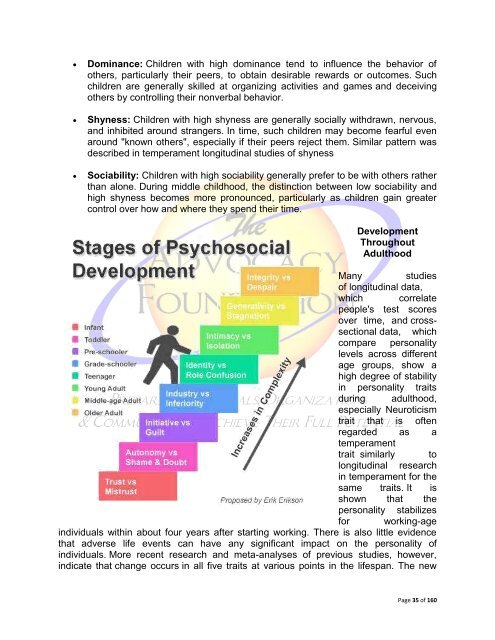The Gift of Introversion
The Gift of Introversion
The Gift of Introversion
You also want an ePaper? Increase the reach of your titles
YUMPU automatically turns print PDFs into web optimized ePapers that Google loves.
Dominance: Children with high dominance tend to influence the behavior <strong>of</strong><br />
others, particularly their peers, to obtain desirable rewards or outcomes. Such<br />
children are generally skilled at organizing activities and games and deceiving<br />
others by controlling their nonverbal behavior.<br />
Shyness: Children with high shyness are generally socially withdrawn, nervous,<br />
and inhibited around strangers. In time, such children may become fearful even<br />
around "known others", especially if their peers reject them. Similar pattern was<br />
described in temperament longitudinal studies <strong>of</strong> shyness<br />
Sociability: Children with high sociability generally prefer to be with others rather<br />
than alone. During middle childhood, the distinction between low sociability and<br />
high shyness becomes more pronounced, particularly as children gain greater<br />
control over how and where they spend their time.<br />
Development<br />
Throughout<br />
Adulthood<br />
Many studies<br />
<strong>of</strong> longitudinal data,<br />
which correlate<br />
people's test scores<br />
over time, and crosssectional<br />
data, which<br />
compare personality<br />
levels across different<br />
age groups, show a<br />
high degree <strong>of</strong> stability<br />
in personality traits<br />
during adulthood,<br />
especially Neuroticism<br />
trait that is <strong>of</strong>ten<br />
regarded as a<br />
temperament<br />
trait similarly to<br />
longitudinal research<br />
in temperament for the<br />
same traits. It is<br />
shown that the<br />
personality stabilizes<br />
for working-age<br />
individuals within about four years after starting working. <strong>The</strong>re is also little evidence<br />
that adverse life events can have any significant impact on the personality <strong>of</strong><br />
individuals. More recent research and meta-analyses <strong>of</strong> previous studies, however,<br />
indicate that change occurs in all five traits at various points in the lifespan. <strong>The</strong> new<br />
Page 35 <strong>of</strong> 160

















